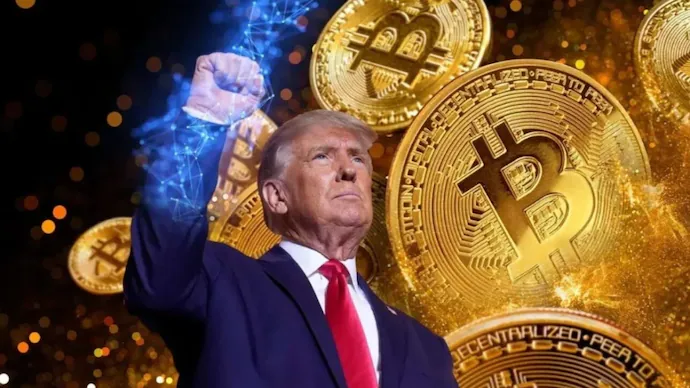
As the 2024 U.S. presidential election draws nearer, former President Donald Trump has made headlines with a bold proclamation: he aims to be the first “Crypto President.” This statement has ignited considerable debate and speculation about what a Trump presidency could mean for the future of cryptocurrency in the United States. Given his previous criticisms of Bitcoin and other digital assets, his newfound enthusiasm signals a significant shift. More importantly, it invites scrutiny into how his personal investments and political ambitions could intersect and shape national policy.
From Critic to Crypto Crusader
In the past, Trump has been openly critical of cryptocurrencies. In 2019, he tweeted that he was “not a fan of Bitcoin and other cryptocurrencies,” asserting that their value is based on “thin air” and facilitating illegal activities. However, his tone has shifted dramatically in recent years, particularly as he has become more involved in the digital asset space through investments and public endorsements of NFTs (non-fungible tokens) linked to his brand.
This evolution from skeptic to advocate raises important questions about authenticity and motive. Is Trump genuinely convinced of the transformative potential of blockchain technology, or is this a calculated move to align with a rapidly growing demographic of crypto-savvy voters and donors? Either way, the implications are far-reaching.
Trump’s Crypto Investments and Business Interests
Trump’s pivot toward crypto is not just rhetorical. He and his family have been involved in various blockchain-related ventures. Notably, Trump released a series of NFT trading cards in 2022 that reportedly generated millions in revenue. Additionally, members of his inner circle, including his son-in-law Jared Kushner, have shown interest in crypto-related investments and initiatives.
These financial entanglements raise concerns about potential conflicts of interest. If elected, Trump’s crypto holdings and affiliations could influence regulatory decisions, tax policies, and federal funding initiatives. While investment in cryptocurrency by politicians is not inherently unethical, transparency and clear boundaries are crucial to maintaining public trust.
Policymaking Under a Crypto President
If Trump were to assume office with a pro-crypto stance, several areas of policymaking would likely be impacted:
- Regulatory Clarity:
One of the most significant challenges facing the crypto industry in the U.S. is regulatory uncertainty. Agencies like the Securities and Exchange Commission (SEC) and the Commodity Futures Trading Commission (CFTC) often clash over jurisdiction. A Trump administration might push for clearer, more crypto-friendly regulations, potentially creating a unified framework that favors innovation. - Tax Policy:
Trump has historically favored tax cuts and deregulatory measures. A pro-crypto tax policy might include reduced capital gains taxes on digital asset transactions or tax incentives for blockchain startups. Such measures could spur innovation but also raise equity concerns. - Central Bank Digital Currency (CBDC):
Trump has expressed skepticism about a U.S. central bank digital currency, portraying it as a tool for governmental overreach and surveillance. His administration might oppose or delay any moves by the Federal Reserve to issue a CBDC, favoring decentralized private-sector alternatives instead. - National Security and Cybercrime:
Cryptocurrencies have been linked to illicit activities such as ransomware attacks and money laundering. A Trump administration might increase funding for blockchain forensics and cybersecurity measures to combat these threats while promoting lawful use. - Global Competitiveness:
Under Trump, there may be a push to ensure that the U.S. remains a leader in blockchain technology. This could include increased R&D funding, educational initiatives, and international collaborations to set global standards.
Populism Meets Decentralization
Trump’s appeal to populism aligns intriguingly with the ethos of cryptocurrency, which emphasizes decentralization, individual empowerment, and resistance to centralized authority. By embracing crypto, Trump may be attempting to tap into a broader narrative of financial liberation and anti-establishment sentiment. This alignment could resonate deeply with younger, tech-savvy voters disillusioned with traditional financial systems.
However, this populist alignment is not without its contradictions. Trump’s political and business history is marked by ties to large financial institutions and centralized power structures. Reconciling this background with the decentralized philosophy of cryptocurrency could prove challenging and potentially expose inconsistencies in policy implementation.
Ethical Considerations and Transparency
A central concern surrounding Trump’s crypto advocacy is the ethical dimension. With significant personal and familial investments in digital assets, there is a legitimate risk of policymaking being influenced by personal financial interests. To address these concerns, Trump would need to commit to unprecedented transparency regarding his holdings and recuse himself from decisions that directly affect his financial interests.
Moreover, the appointment of regulatory officials with strong ties to the crypto industry could lead to regulatory capture, undermining the impartiality of financial oversight. Ensuring that such appointments are made based on merit and expertise, rather than loyalty or personal gain, would be crucial for maintaining integrity.
Impacts on the Broader Political Landscape
Trump’s crypto-centric campaign could have ripple effects across the political spectrum. Other candidates, both Democratic and Republican, may be compelled to articulate their positions on digital assets more clearly. This could elevate crypto policy to a mainstream electoral issue, influencing debates, campaign contributions, and legislative priorities.
Furthermore, lobbying efforts by the crypto industry are likely to intensify, seeking to capitalize on a potentially favorable administration. This could lead to increased political polarization on crypto issues, with some viewing it as a tool for economic empowerment and others warning of its risks to financial stability and consumer protection.
Conclusion: A Double-Edged Sword
Donald Trump’s ambition to become the first “Crypto President” presents a complex interplay of opportunity and risk. On one hand, his advocacy could usher in a new era of innovation, regulatory clarity, and economic dynamism in the digital asset space. On the other, his personal investments and controversial political style raise serious questions about ethics, transparency, and the equitable formulation of policy.
Ultimately, the impact of Trump’s crypto involvement on policymaking will depend on the balance he strikes between personal interest and public duty. As with any transformative technology, the path forward requires thoughtful, inclusive, and principled leadership. Whether Trump can provide that remains an open question, but the mere emergence of crypto as a central campaign theme marks a significant milestone in the political maturation of digital assets.
